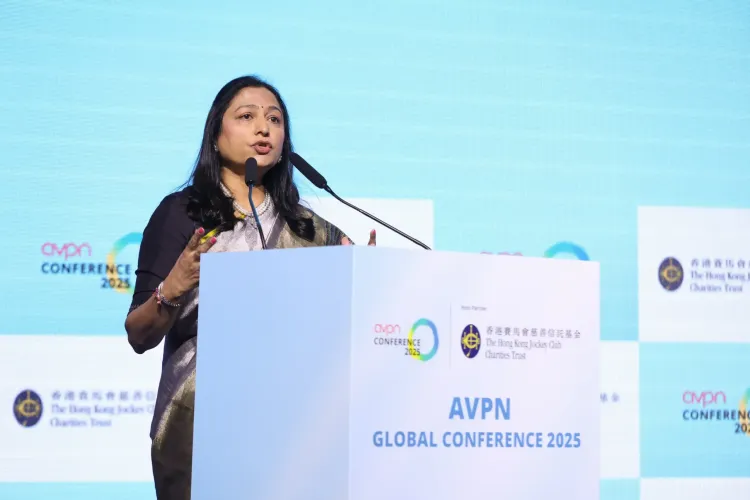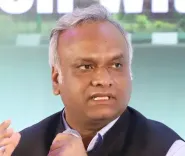How is Dr Priti Adani Inspiring Global Philanthropy at the Hong Kong Summit?

Synopsis
Key Takeaways
- Philanthropy should evolve beyond charity.
- Collaboration is essential in creating lasting change.
- Beneficiaries can become multipliers of impact.
- True success is measured by the stories behind the numbers.
- Commitment to shared values is crucial for sustainable growth.
Hong Kong, Sep 9 (NationPress) In front of an enthusiastic crowd at the Asian Venture Philanthropy Network (AVPN) summit in Hong Kong, Dr Priti Adani, chairperson of the Adani Foundation, passionately urged for a shift in philanthropy from mere charity to a collective mission grounded in responsibility.
She opened with a poignant story from the arid landscapes of Kutch, where she witnessed a woman planting seeds in the parched earth.
When queried about her actions in such harsh conditions, the woman responded that someday the rains would arrive, and if she didn't plant the seeds, there would be nothing for the rains to nurture.
This powerful image of resilience became a symbol for Dr Adani’s vision of philanthropists, framing the AVPN as more than just a network but as a movement akin to rivers converging into a vast ocean of transformation.
Reflecting on her journey from a young dentist in Ahmedabad to dedicating her life to support her husband Gautam Adani’s dream of nation-building, she emphasized that true development is measured not by what is built, but by what is sustained—schools, hospitals, and livelihoods that uplift communities.
She shared that this belief led to the establishment of the Adani Foundation in 1996, which has evolved into one of India’s most significant social impact organizations, fueled by a $7 billion family commitment to philanthropy.
Today, the Foundation focuses on education, healthcare, nutrition, sustainable livelihoods, community infrastructure, and climate action, reaching 7,000 villages and impacting over 9.6 million individuals.
However, Dr Adani emphasized that the true impact of the Foundation cannot be quantified merely by statistics but through the narratives they inspire.
She recounted the story of Vansh, a three-year-old from Gujarat who, weighing just eight kilograms, was on the brink of malnutrition until a local woman trained by the Foundation intervened, aiding his mother and restoring his health.
She also highlighted Rekha, a widow from Maharashtra who rose from despair to become her village's first woman to operate a milk chilling center, motivating over a hundred others to follow suit.
Additionally, she narrated the inspiring journey of Sonal, a girl from Mundra who attended an Adani school, pursued a master’s degree in Ireland, and now works at Apple, excelling in a prestigious finance competition.
These stories, Dr Adani stated, demonstrate that beneficiaries can transform from being mere recipients of aid to becoming architects of hope and catalysts for change.
Her message to the philanthropy sector was clear.
“This is not a time for applause; it’s a time for commitment,” she stated emphatically.
Real transformation, she asserted, comes from becoming co-builders instead of just donors, ensuring that every contribution is part of a broader partnership with governments, businesses, and communities.
It is about empowering beneficiaries to become multipliers of impact and aligning skills with values so that growth embodies purpose along with opportunity.
Concluding her address, Dr Adani returned to her central metaphor of planting in faith.
“We must be the generation that plants seeds in the drought, that believes even before the rains come, and that cultivates a harvest of dignity and opportunity for everyone,” she urged. The rains, she reminded the assembly, will indeed come, and when they do, history must remember that it was those present who planted the seeds, merged their rivers into a sea of collaboration, and multiplied hope for millions.






